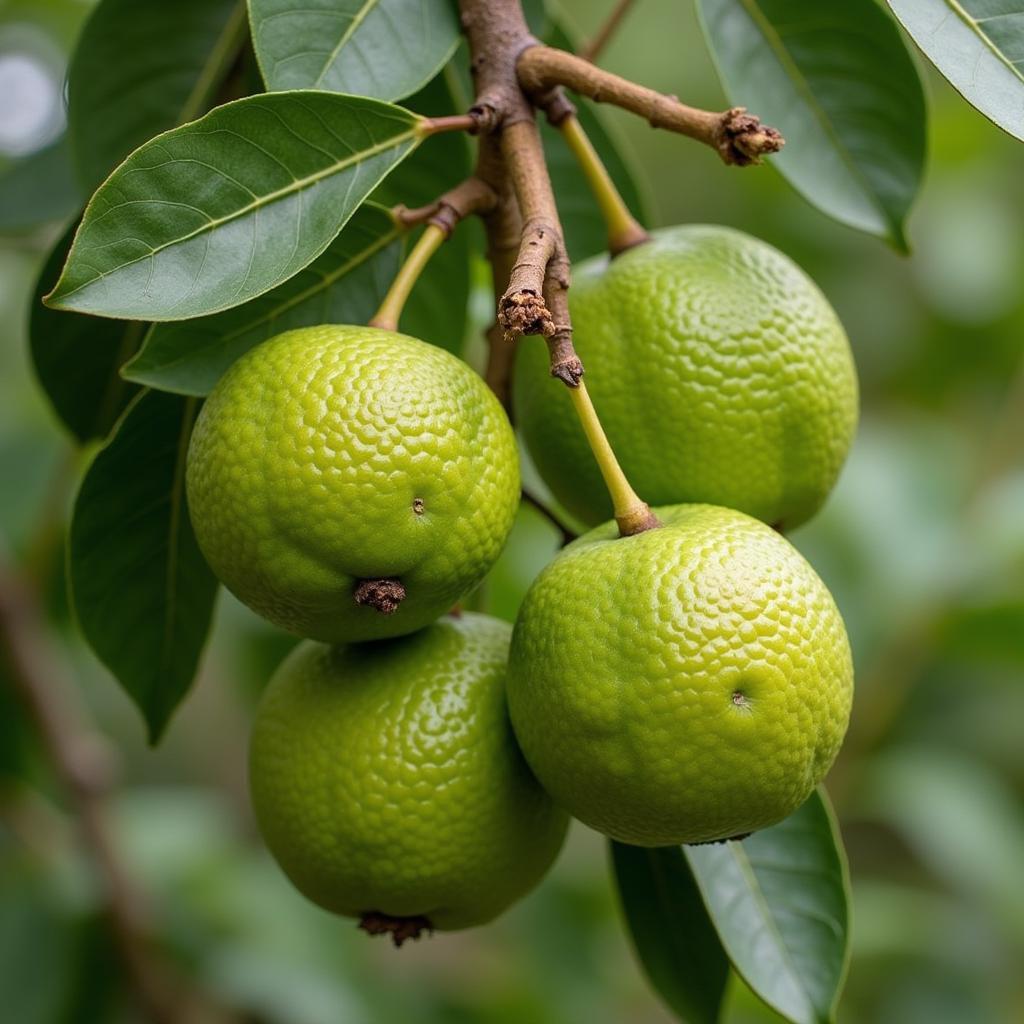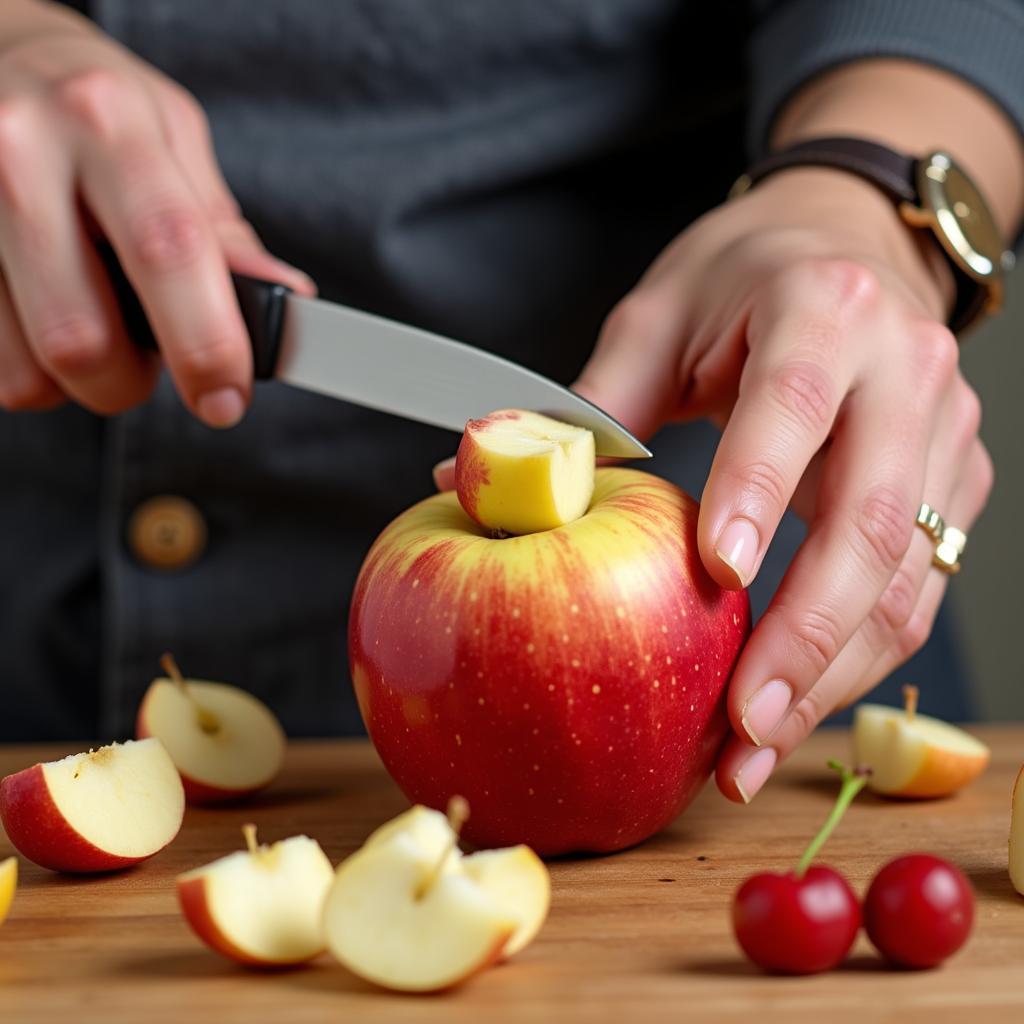Horse apples – the colloquial term for what we often call Osage oranges – are a peculiar fruit that piques the curiosity of horse owners and enthusiasts alike. While not technically apples, these bumpy, green orbs are often found scattered beneath trees in pastures, leading many to wonder about their suitability for horses. If you’re asking, “Where Can You Buy Horse Apples?” you’re in the right place. This guide will explore the ins and outs of this unique fruit, addressing where to find them, their benefits, and important considerations for feeding them to your equine companions.
Decoding the Mystery of Horse Apples: What Exactly Are They?
Before we delve into the question of “where can you buy horse apples,” let’s clarify what they are. Despite their nickname, horse apples, or Osage oranges, are not related to apples or oranges. They come from the Osage orange tree (Maclura pomifera), native to North America. These trees are known for their hard, durable wood and striking, bumpy fruit that ripens in the fall.
 Osage Orange Fruit on Tree
Osage Orange Fruit on Tree
Where Can You Buy Horse Apples? Unveiling the Sources
When it comes to acquiring horse apples, you’ll likely encounter a unique challenge: they aren’t typically sold commercially. This is primarily because the fruit itself is not generally consumed by humans and has limited practical applications beyond its decorative uses. However, if you’re determined to get your hands on these intriguing fruits, here are a few avenues to explore:
- Local Sourcing: Your best bet for finding horse apples is to seek them out in your local area. Look for Osage orange trees in parks, forests, or along rural roadsides, particularly during the fall months when the fruit ripens and falls to the ground.
- Online Marketplaces: While less common, you might occasionally find horse apples listed for sale on online marketplaces like eBay or Etsy, particularly around the fall season. Keep in mind that availability can be limited and prices may vary.
Are Horse Apples Safe for Horses? Benefits and Cautions
While horses can technically consume horse apples, it’s crucial to approach this with caution. Here’s a breakdown of the potential benefits and drawbacks:
Benefits:
- Natural Fly Repellent: Horse apples are known for their insect-repelling properties. The fruit contains compounds that release a citrusy aroma when crushed, which can deter flies and other pests.
Cautions:
- Toxicity Concerns: While the fruit’s flesh is generally considered non-toxic to horses, the milky sap contained within the fruit, leaves, and bark of the Osage orange tree can be irritating and potentially toxic if ingested in large quantities.
- Choking Hazard: The large size and hard texture of horse apples pose a choking hazard, especially for smaller horses or those prone to bolting their food.
Incorporating Horse Apples for Horses: Tips and Precautions
If you choose to offer horse apples to your horses, prioritize safety and moderation:
- Offer in Moderation: Start with a very small amount to assess your horse’s tolerance. Observe for any adverse reactions such as digestive upset, loss of appetite, or signs of colic.
- Break it Down: Chop the horse apple into smaller, more manageable pieces to reduce the risk of choking.
 Cutting a Horse Apple for Safe Feeding
Cutting a Horse Apple for Safe Feeding
Beyond Consumption: Alternative Uses for Horse Apples
While feeding horse apples to horses should be approached with caution, these curious fruits can serve other purposes around the barn:
- Natural Pest Control: Place whole or halved horse apples around your barn, stables, or even in your home to deter insects. Their natural aroma can help keep flies, spiders, and other creepy crawlies at bay.
- Decorative Accents: Horse apples’ unique texture and vibrant green color make them interesting additions to fall decorations. Consider incorporating them into wreaths, centerpieces, or other festive arrangements.
Seeking Expert Advice
If you have any concerns about feeding horse apples to your horses or are unsure about their suitability for your equine companions, it’s always best to consult with your veterinarian. They can provide personalized advice based on your horse’s individual needs and health status.
Navigating the World of Horse Apples: A Balanced Approach
While the question “where can you buy horse apples” might lead you on an unconventional search, it opens the door to discovering the unique properties of this intriguing fruit. While not a staple food source for horses, horse apples can offer potential benefits as a natural fly repellent and decorative element. Remember to prioritize safety by offering them in moderation, preparing them appropriately, and always seeking guidance from your veterinarian to ensure the well-being of your equine companions.
Frequently Asked Questions About Horse Apples
1. Are horse apples poisonous to horses?
The flesh of the horse apple is generally considered non-toxic to horses. However, the milky sap found within the fruit, leaves, and bark of the Osage orange tree can be irritating and potentially toxic in large quantities.
2. Can horses eat horse apples whole?
It is not recommended to feed horses whole horse apples due to the choking hazard they present. Always chop the fruit into smaller, more manageable pieces.
3. What are the signs of toxicity in horses after consuming horse apples?
If a horse consumes a significant amount of the toxic sap from the Osage orange tree, it may exhibit symptoms such as mouth irritation, drooling, vomiting, diarrhea, or colic. Contact your veterinarian immediately if you observe any of these signs.
4. Where can I find horse apples?
Horse apples are not typically sold commercially. Your best bet is to locate Osage orange trees in your local area, such as parks, forests, or rural properties.
5. Can I use horse apples for anything other than potentially feeding them to my horses?
Yes, horse apples are known for their insect-repelling properties and can be used as a natural pest control method around the barn or home. They also make unique and interesting decorative accents, particularly during the fall season.
Need More Help?
Do you have more questions about horse apples or other aspects of horse care? We’re here to help!
-
Check out our other informative articles on bulk psyllium husk for horses and black horse candy for more insights on equine health and nutrition.
-
For personalized assistance, don’t hesitate to reach out to our dedicated team. You can contact us at:
- Phone: 0772127271
- Email: [email protected]
- Address: QGM2+WX2, Vị Trung, Vị Thuỷ, Hậu Giang, Việt Nam
Our customer care team is available 24/7 to address your questions and provide expert advice.